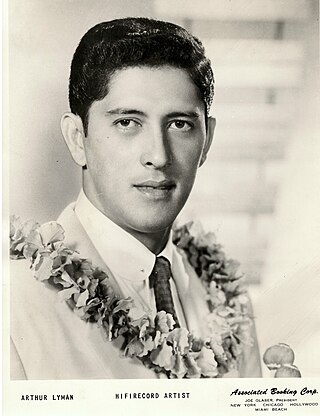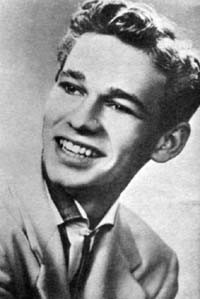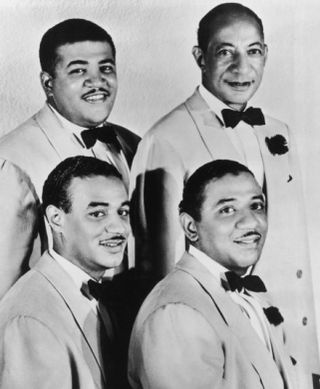Related Research Articles
Martin Denny was an American pianist, composer, and arranger. Known as the "father of exotica," he was a multi-instrumentalist and could play a number of percussion instruments. In a long career that saw him performing up to 3 weeks prior to his death, he toured the world popularizing his brand of lounge music which included exotic percussion, imaginative rearrangements of popular songs, and original songs that celebrated Tiki culture.

Arthur Hunt Lyman was a Hawaiian jazz vibraphone and marimba player. His group popularized a style of faux-Polynesian music during the 1950s and 1960s which later became known as exotica. His albums became favorite stereo-effect demonstration discs during the early days of the stereophonic LP album for their elaborate and colorful percussion, deep bass and 3-dimensional recording soundstage. Lyman was known as "the King of Lounge music."

Dot Records was an American record label founded by Randy Wood and Gene Nobles that was active between 1950 and 1978. The original headquarters of Dot Records were in Gallatin, Tennessee. In its early years, Dot specialized in artists from Tennessee. Then it branched out to include musicians from across the U.S. It recorded country music, rhythm and blues, polkas, waltzes, gospel, rockabilly, pop, and early rock and roll.

William Vaughn, popularly known as Billy Vaughn was an American musician, singer, multi-instrumentalist, orchestra leader, and A&R man for Dot Records.

Harold Lloyd Jenkins, better known by his stage name Conway Twitty, was an American singer and songwriter. Initially a part of the 1950s rockabilly scene, Twitty was best known as a country music performer. From 1971 to 1976, Twitty received a string of Country Music Association awards for duets with Loretta Lynn. He was inducted into both the Country Music and Rockabilly Halls of Fame.

Thomas Adrian Sands is an American pop music singer and actor. Working in show business as a child, Sands became an overnight sensation and instant teen idol when he appeared on Kraft Television Theater in January 1957 as "The Singin' Idol". The song from the show, "Teen-Age Crush", reached No. 2 on the Billboard Hot 100 and No. 1 on Cashbox.

John Preston Courville, known professionally as Johnny Preston, was an American rock and roll singer, best known for his 1960 international number one hit "Running Bear".

Felice Bryant and Diadorius Boudleaux Bryant were an American husband-and-wife country music and pop songwriting team. They were best known for songs such as "Rocky Top," "We Could", "Love Hurts", and numerous hits by the Everly Brothers, including "All I Have to Do Is Dream", "Bye Bye Love", and "Wake Up Little Susie".

Ray Peterson was an American pop singer who is best remembered for singing "Tell Laura I Love Her". He also scored numerous other hits, including "Corrine, Corrina" and "The Wonder of You".
"Walkin' to Missouri" is a popular song written by Bob Merrill in 1952. Sammy Kaye's version peaked at No. 11 (U.S.) in 1952. In the United Kingdom, Tony Brent's cover version reached No. 7 in the UK Singles Chart in January 1953.
Albert Narvel Felts is an American country music and rockabilly singer. Known for his soaring tenor and high falsetto, Felts enjoyed his greatest success during the 1970s, most famously 1975's "Reconsider Me".

Ronnie Self was an American rockabilly singer and songwriter. His solo career was unsuccessful, despite being signed to contracts with Columbia and then Decca from the late 1950s through the early 1960s. His only charted single was "Bop-A-Lena"; recorded in 1957 and released in 1958, it reached No. 68 on the Billboard charts. His boastful country anthem "Ain't I'm a Dog" was a regional hit in the South, but failed to score nationally. It reached #31 in Australia and Bop-A-Lena #25.

Alessandro Carmelo "Teddy" Randazzo was an American pop songwriter, singer, arranger and producer, who composed hit songs such as "Goin' Out of My Head", "It's Gonna Take a Miracle", "Pretty Blue Eyes", and "Hurt So Bad" in the 1960s.

"Hello Darlin'" is a song written and recorded by American country music artist Conway Twitty. It was released in March 1970 as the first single and title track from the album Hello Darlin. The song was Twitty's fourth No. 1 song on the Billboard magazine Hot Country Singles chart. The song spent four weeks atop the Billboard Hot Country Singles chart that summer, and was named the No. 1 song of 1970. Aside from being Twitty's standard concert opener, the song became a country standard as well as his signature song. When performing with Loretta Lynn, Twitty would frequently sing the song directly to Loretta. Twitty's recording was added to the Grammy Hall of Fame in 1999.
"Blue Hawaii" is a popular song written by Leo Robin and Ralph Rainger for the 1937 Paramount Pictures film Waikiki Wedding, starring Bing Crosby and Shirley Ross. Crosby recorded a version with backing by Lani McIntyre and His Hawaiians, which was released in 1937 as the B-side of "Sweet Leilani". This reached the No. 5 spot in the charts of the day during a 13-week-stay
James “Kimo” Wilder McVay was an American musician turned talent manager, who successfully promoted Hawaiian entertainment acts. McVay promoted and managed acts such as teenage heartthrob Robin Luke, Don Ho, New Zealand singer John Rowles, comic Andy Bumatai, Keolo and Kapono Beamer, ventriloquist Freddie Morris, magician John Hirokawa and many others.

During his career as a singer and composer, Pat Boone released 63 singles in the United States, mostly during the 1950s and early 1960s when Boone was a successful pop singer and, for a time, the second-biggest charting artist behind Elvis Presley according to Billboard. Boone has had over 25 singles reach the top 20 on the U.S. singles charts, including the number-one hits "Ain't That a Shame" (1955), "I Almost Lost My Mind" (1956), "Don't Forbid Me" (1957), "Love Letters in the Sand" (1957), "April Love" (1957), and "Moody River" (1961). "I'll Be Home" (1956) reached No. 1 in the UK. He set a Billboard record, which he still holds, for spending 220 consecutive weeks on the charts with one or more songs each week.

The Mills Brothers, sometimes billed The Four Mills Brothers and originally known as Four Boys and a Guitar, were an American jazz and traditional pop vocal quartet who made more than 2,000 recordings that sold more than 50 million copies and garnered at least three dozen gold records.
"Susie Darlin'" is a 1958 single by Robin Luke. Luke's rendition peaked at #5 on the Billboard Hot 100 and went to #1 on the CHUM Chart in 1958. A cover version by Tommy Roe had "Susie Darlin'" re-enter the Billboard Hot 100 in 1962 and peaked at #35. "Susie Darlin'" sold a million copies in the United States.
Champ Clark Butler was an American popular music singer who had several Billboard singles chart hits in the 1950s, and recorded primarily for Columbia Records. The label's head of A & R, Mitch Miller, writing about Butler's singing in 1953, described him as "one of the most versatile lads in the business." Butler had six gold records, with his singles "Them There Eyes", "Down Yonder", "Oh, Looka There, Ain't She Pretty", "Be Anything ", "Fit as a Fiddle" and "I Apologize". He also featured in a nightly CBS television show, Musical Nightcap, for over two years.
References
- ↑ "Robin Luke". Rockabillyhall.com. Retrieved 24 October 2017.
- 1 2 Murrells, Joseph (1978). The Book of Golden Discs (2nd ed.). London: Barrie and Jenkins Ltd. p. 104. ISBN 0-214-20512-6.
- ↑ Roberts, David (2006). British Hit Singles & Albums (19th ed.). London: Guinness World Records Limited. p. 333. ISBN 1-904994-10-5.
- ↑ "Robin Luke with His Only Hit "Susie Darlin'" – Mental Itch". Mentalitch.com. 18 June 2015. Retrieved 24 October 2017.
- ↑ "'Oh Susie Darlin', Robin Luke and the Roomates, Hemsby 2012[sic]". YouTube. 14 May 2012. Archived from the original on 2021-12-12. Retrieved 24 October 2017.